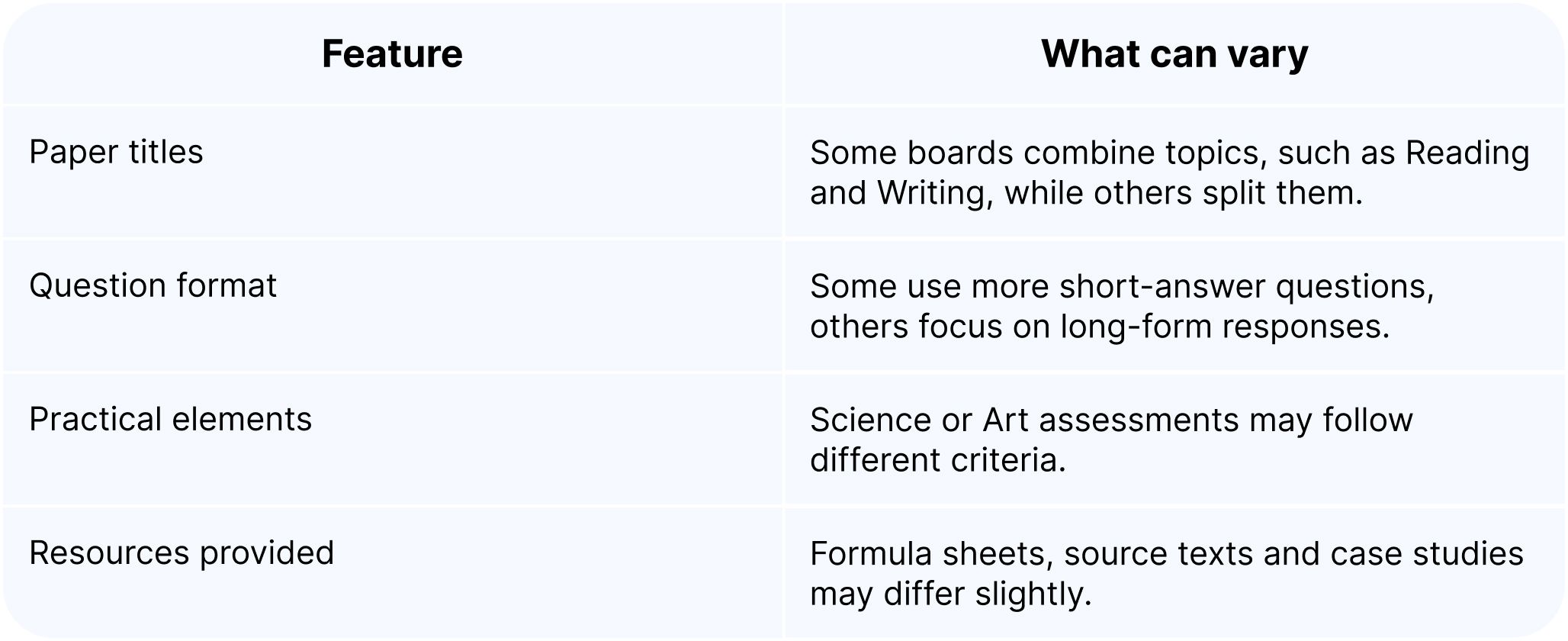Contents
Confused about the different GCSE exam boards?
You’re not alone. With names like AQA, Edexcel, OCR, WJEC and CCEA thrown around, it’s easy to feel overwhelmed, especially as schools and even individual subjects, may use different exam boards.
This guide will explain each exam board, how they compare, and what it means for GCSE preparation.
Understanding the differences between exam boards can help students revise more effectively and approach past papers and assessments with greater confidence.
In this guide, we’ll break down:
What an exam board does
The differences between the five main GCSE boards
Why understanding your board matters for revision and GCSE success
What are GCSE exam boards and why do they matter?
GCSE exam boards are the organisations responsible for setting and marking exam papers. They design the content, structure, and assessment criteria for each GCSE subject. While all boards follow the national curriculum requirements set by Ofqual, the way topics are taught, assessed, and worded can differ between boards.
Knowing the exam board helps to:
Focus revision on the right content
Practise with past papers that match exam style
Understand how exams will be marked
Where is each GCSE exam board used?
Most students in England, Wales and Northern Ireland sit exams from one of five main boards. The subject department usually chooses the school's board and will stay consistent throughout the GCSE course.
AQA, Edexcel and OCR are used in schools across England
WJEC (Eduqas) is common in Wales and is also used by some schools in England
CCEA is mainly used in Northern Ireland
Schools will share which board they're using for each GCSE subject, or you can work it out by checking course specifications or past papers provided in class.
Format and structure
While all boards assess the same subject areas, they may differ in:

Understanding these differences helps to target revision more effectively and avoid surprises on exam day.
GCSE Exam Boards Overview
Here’s a quick guide to the five main boards and what they’re known for:
AQA
(Assessment and Qualifications Alliance)
One of the largest boards in the UK
Popular for English, Science and Humanities
Known for detailed mark schemes and balanced papers
Website: aqa.org.uk
Edexcel
(Pearson Edexcel)
Run by the global education company Pearson
Offers both GCSE and International GCSE qualifications
Frequently used for Maths and Business Studies
Known for structured, clearly scaffolded exam papers
Website: qualifications.pearson.com
OCR
(Oxford, Cambridge and RSA Examinations)
Part of Cambridge University Press and Assessment
Offers both academic and vocational qualifications
Known for subjects like Computer Science and History
Website: ocr.org.uk
WJEC
(Welsh Joint Education Committee)
The main exam board for schools in Wales
Offers qualifications through its English brand, Eduqas
Used by some English schools for English, Drama and RE
Website: eduqas.co.uk
CCEA
(Council for the Curriculum, Examinations and Assessment)
Northern Ireland’s dedicated exam board
Covers all major subjects for GCSE and A level in Northern Ireland
Website: ccea.org.uk
Marking and Grading
All exam boards use the same 9 to 1 grading system, and Ofqual regulates marking to ensure fairness.
Each board:
Trains examiners to mark consistently across subjects
Publishes grade boundaries after results are in
Allows for appeals and reviews of marking
Grade boundaries can differ slightly between boards depending on the difficulty of each paper in a given year.
Common challenges
1. Not knowing the correct exam board
Many students don’t realise which exam board they’re studying with until well into Year 10 or 11. This can make accessing the right revision materials and past papers harder. Knowing the exam board early helps to avoid wasting time on resources that don’t match the correct syllabus.
2. Practising with the wrong past papers
Not all GCSE papers are created the same. Different exam boards phrase questions differently, organise their papers in unique ways, and sometimes focus on slightly different content. Using past papers from the wrong board can cause confusion and lead to poor exam technique.
3. Confusing exam formats between subjects
Sitting GCSEs across multiple exam boards (which is common) can make it difficult to keep track of how each subject is assessed. Some papers have short-answer sections followed by essays, while others are fully multiple-choice or data-heavy. This can cause problems if revision strategies are not tailored to the specific format.
4. Misunderstanding the specification
Each exam board publishes detailed specifications for every subject. However, many students revise from general textbooks or notes that do not always match their specific course. This can result in time spent on topics that will not be tested, or key areas missed entirely.
Top tips for success
1. Ask subject teachers about the exam board
It might sound simple, but this is one of the most important steps to take early in Year 10. Make a note of the exam board and official course code for each subject, this will be the foundation for all revision planning moving forward.
2. Download and read the specification
Every exam board provides a detailed document outlining exactly what students need to know. It includes topic lists, skills they’ll be assessed on, and sometimes sample questions. Print it, highlight it, and refer back to it.
3. Use board-specific past papers
These show how questions are asked and how marks are awarded. Try completing papers under timed conditions and then mark them using the official mark scheme. This helps to understand what examiners are looking for and where marks are often lost.
4. Get familiar with the paper structure
Each board has its own format. Some split papers into multiple sections, each with different types of tasks. Knowing how long to spend on each section and what kinds of responses are expected will help students feel more confident on the day.
5. Practise the language used in each paper
Examiners from different boards phrase their questions in slightly different ways. By reading and practising questions written by a specific board, students will be better prepared to understand what’s really being asked.
Summary: What you need to know
All exam boards follow the same national curriculum, but each one puts its own spin on structure, wording and assessment style. Understanding which board you're working with can help you revise more effectively, reduce confusion and feel more prepared heading into exam season.
Don’t miss Atom’s GCSE giveaway!

Six months. Six epic prizes. Six chances to make the GCSE season unforgettable.
We’re launching Atom for GCSE prep in 2026, and to celebrate, over the next six months, we’re giving away thousands of pounds worth of prizes to help your child level up their GCSE revision.
Here’s a taste of what’s up for grabs:
The latest Apple tech, including an iPad Air, Vision Pro and more
Festival tickets for Boardmasters and Reading 2026
Europe interrail passes and £1,000 spending money
…and that’s just a few of the amazing prizes available.
Our first two winners have already taken home incredible prizes! Find out who they are and what they won in our latest giveaway update and keep an eye out for news of our November winner.
It’s free to join. UK only. Full T&Cs apply.
Contents
